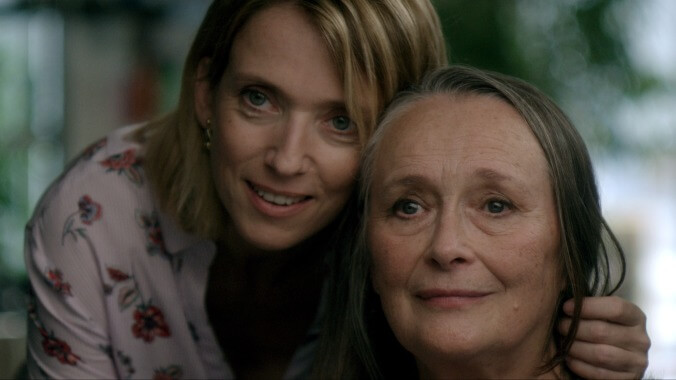is a romantic drama that often plays more like a horror movie: A woman hides behind a shower curtain. A pan sizzles for an unnervingly long amount of time. A figure emerges from the shadows to smash up a car. Director Filippo Meneghetti establishes the unusual tone of his debut feature in a striking opening sequence that seamlessly blends memory and nightmare, as two girls play a surreal game of hide and seek until one of them disappears. The burden of love is the fear of loss, and that unease is compounded when it’s tied to the inability to live as your authentic self. Meneghetti understands that loving someone isn’t just a joyous experience. It’s an anxiety-inducing one, too.
It’s an unusual approach to a story that could easily lean toward sentimentality. Madeleine (Martine Chevallier) and Nina (Barbara Sukowa) are two retirement-aged women who’ve been lovers for years. To the outside world, however, they’re just neighbors and acquaintances who maintain separate apartments on the top floor of a small building in the south of France. Although they regularly talk of moving to Rome to live openly as a couple, Madeleine is too scared to leave the comfort of their clandestine routine—something that frustrates the more free-spirited Nina. Their dreams of starting a life together are put on hold each time Madeleine struggles to come out to her two adult children, Anne (Léa Drucker) and Frédéric (Jérôme Varanfrain). But when a medical crisis strikes, the limitations of Madeleine and Nina’s arrangement reaches a breaking point.
France’s official submission to this year’s Oscar race, Two Of Us explores the experience of being locked in and locked out—both literally and metaphorically. When health issues leave Madeleine separated from Nina and with less agency than ever, she must reckon with her decision to live more for her family than for herself. Nina, meanwhile, must decide how much she wants to fight for the woman who could never openly acknowledge her. Though Meneghetti and co-writer Malysone Bovorasmy’s script is light on backstory, the central issue facing the couple seems to be less overt homophobia and more Madeleine’s fear of rocking the boat. Her children’s adult identities are built around her tumultuous but long-lasting marriage to their now deceased father; telling them about Nina would mean asking them to view her with the complex humanity that children often struggle to give their parents.
After dancing seamlessly from romance to domestic thriller over its first two acts, Two Of Us eventually takes the shape of a septuagenarian Romeo & Juliet—one where the risk isn’t parents misunderstanding their children, but children undervaluing their parents. Like Romeo peering up at Juliet on her balcony, Nina watches Madeleine’s apartment through her peephole, becoming a master spy as she figures out how to stay in her lover’s life despite the tenuousness of their public connection. Sukowa plays Nina as a powerhouse of romantic determination, a woman whose desperate, sometimes shocking behavior is motivated by the bone-deep love we usually associate with teenagers, not women in their retirement years. Meanwhile, Chevallier masterfully conveys Madeleine’s mix of longing and insecurity through the smallest of gestures.
If Two Of Us is a romance by way of a horror movie, Madeleine and Nina are romantic leads by way of final girls. It’s not until you see the two lovers fight for one another that you realize how rare it is to see that kind of romantic agency granted to women in their 60s and 70s. Madeleine and Nina’s love is passionate and sensual, not quiet and mature. And that vitality drives a story that twists and turns in subtle and sometimes startling ways, from the dreaminess of Madeleine and Nina dancing to an Italian version of “I Will Follow Him” to the dramatics of something more akin to a heist.
Two Of Us’ fleet 95 minute runtime makes it easier to forgive the occasional dangling plot thread or underdeveloped through-line. As Madeleine’s protective daughter, Léa Drucker turns in an intriguingly complex performance that could use more scenes exploring her conflicted point of view. The same goes for an uneven subplot involving a skeptical nurse (Muriel Bénazéraf). But despite the occasional misstep, Meneghetti has crafted a tonally unpredictable romance that surprises until its very last shot. It’s an impressively confident debut, one that Sukowa and Chevallier bring to life with the verve of two actors in their prime.


 Keep scrolling for more great stories from A.V. Club.
Keep scrolling for more great stories from A.V. Club.